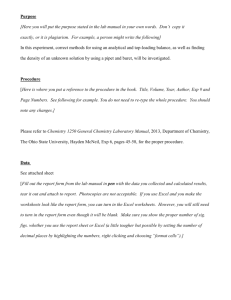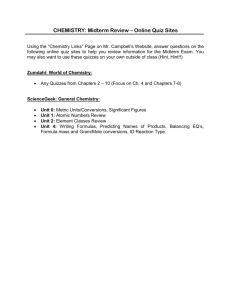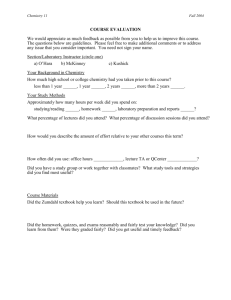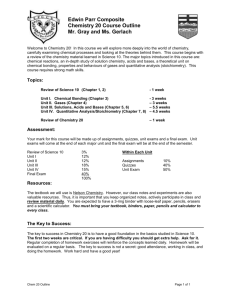CHEMISTRY 3A INTRODUCTION TO CHEMISTRY
advertisement
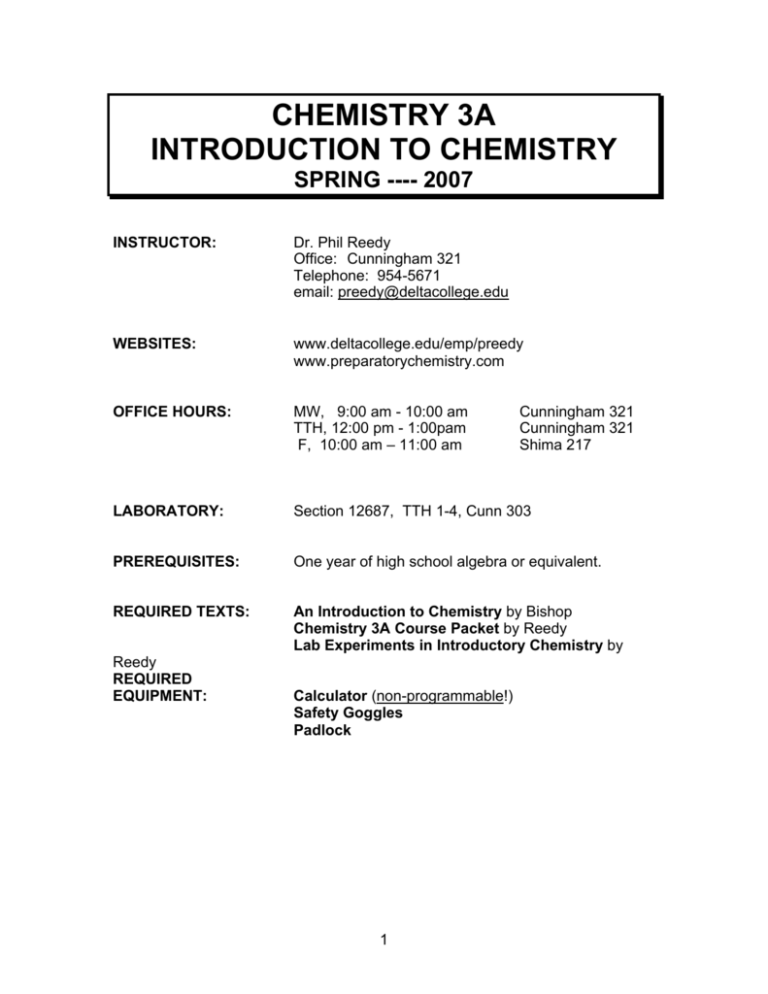
CHEMISTRY 3A INTRODUCTION TO CHEMISTRY SPRING ---- 2007 INSTRUCTOR: Dr. Phil Reedy Office: Cunningham 321 Telephone: 954-5671 email: preedy@deltacollege.edu WEBSITES: www.deltacollege.edu/emp/preedy www.preparatorychemistry.com OFFICE HOURS: MW, 9:00 am - 10:00 am TTH, 12:00 pm - 1:00pam F, 10:00 am – 11:00 am LABORATORY: Section 12687, TTH 1-4, Cunn 303 PREREQUISITES: One year of high school algebra or equivalent. REQUIRED TEXTS: An Introduction to Chemistry by Bishop Chemistry 3A Course Packet by Reedy Lab Experiments in Introductory Chemistry by Reedy REQUIRED EQUIPMENT: Calculator (non-programmable!) Safety Goggles Padlock 1 Cunningham 321 Cunningham 321 Shima 217 COURSE DESCRIPTION: Chemistry 3A is a study of the fundamentals of inorganic chemistry. This course is designed to provide you with a basic understanding of the principles of chemistry and to prepare you to take more advanced chemistry courses such as CHEM 1A. Although having taken prior courses in chemistry may benefit you, this course is taught with the assumption that you have never studied chemistry before, or if you did, it was before the Beatles broke up. In addition to mastering the basic concepts of chemistry, I hope to show you that, contrary to many of your preconceived notions, chemistry can be practical and fun. There will be many classroom demonstrations designed to educate and entertain you, and as time permits, a look into the practical side of chemistry. Questions from students about everyday applications of chemistry are always welcome. COURSE GOALS: The general aim of this course is to introduce the beginning science student with limited or no chemistry background to basic chemical principles which they can apply to many different fields of study. This course may also be used as a preparatory course for the more advanced Chem 1A. Upon completing this course, the student will be able to recognize and name simple compounds. They should learn problem solving techniques related to the use of the metric system, solution chemistry, gas laws, and mole-mole relationships. The student should be able to identify specific classes of reactions and apply them to other situations, have a working knowledge of atomic structure, and be able to apply its theory to reaction chemistry. The student will also learn to identify and use many different pieces of chemical glassware and will have a basic understanding of lab procedure and chemical safety. 2 COURSE OUTLINE: The following general topics will be covered in the course. 1. Use of math in chemistry - metric system, scientific notation, significant figures, and density. 2. Physical and chemical properties and changes of matter. 3. Naming of chemical compounds - acids and ionic and molecular compounds. 4. The atom and electronic structure. 5. The Periodic Table. 6. Chemical bonds 7. Chemical reactions. 8. Mass to mass relationships in chemical reactions. 9. Solution chemistry - molarity, molality, normality, and weight percent. 10. Gas laws. 11. Oxidation - reduction reactions. GRADING: Your grade will be determined by a combination of exams, quizzes, and laboratory reports. EXAMS: There will be three exams worth 100 points each, plus a comprehensive final exam worth 150 points. The tentative exam dates are shown in the attached schedule. There will be no make-up exams, so please let me know as early as possible if you must miss an exam. If you miss an exam for a valid reason, your score on the final exam will also be the score for the missing exam. If you take all three exams, the lowest score of the three may be replaced by the final exam score. 3 QUIZZES: A total of eight quizzes will be given periodically and will be worth 10 points each. As with exams, there will be no make-up quizzes, but you will be allowed to drop your lowest two quiz scores. The dates of the quizzes will be announced in class. LABORATORY: Laboratory experiments will be conducted each week and will be worth 10 points each. Your laboratory work will comprise 15 % of the overall course grade. Lab reports will be due one week after completion of the experiment. Points will be deducted from late lab reports. Completion of laboratory experiments and reports is mandatory. Failure to earn 70% of the laboratory points may result in a failing grade in the course. WORKSHEETS: Worksheets will be provided for each chapter as well as for review purposes prior to each exam. To encourage you to complete the worksheets prior to class, I will periodically check them to see if they have been completed. For each completed worksheet, you will receive a bonus point. These points can be used to replace a laboratory experiment at the end of the semester. If you collect ten points (the maximum), your lowest lab score will become a ten. ATTENDANCE: Although attendance is not graded, regular attendance is important for success in any course, and particularly in chemistry. Quizzes and exams will be given at the beginning of the class period, so ontime arrival is imperative. While attendance does not contribute to your point total for the course, I will be more inclined to be generous to students with borderline grades if they have attended regularly and participated in class. HOMEWORK: Homework will be assigned for each chapter. While the homework will not be collected or graded, you will find it invaluable in preparing for exams and quizzes. 4 OVERALL GRADE: Your overall grade will be calculated as a percentage of total points earned during the quarter. The approximate grading scale is shown below: A: B: C: D: F: 90% and above 80% - 90% 70% - 80% 60% - 70% below 60% 5 6 CHEMISTRY 3A ---- SPRING 2007 ASSIGNMENT SCHEDULE WEEK OF LECTURE LABORATORY January 15 No Class Monday CH 1 Check-In January 22 CH 8 Exp 1 - Measurement and Density Exp 3 - Identification of an Unknown Liquid January 29 CH 2 Exp 7 – Reactions of Alkaline Earth Metals February 5 CH 11 Exp 6 - Atoms and Light February 12 CH 3 No Class Friday Exp 4 - Separation of an Unknown Mixture February 19 No Class Monday CH 12 Exp 16 - Molecular Model Building February 26 CH 4 Review for Exam 1 Exam 1:CH 1,2,3,8,11,12 March 5 CH 5 Exp 20 – Introduction to Acids and Bases March 12 CH 6 Exp 10 - Double Displacement CH 7 Exp 9 - Single Displacement Reactions Reactions March 19 7 March 26 CH 9 No Class Friday April 2 SPRING BREAK April 9 CH 10 Exp 11 – Empirical Formula April 16 CH 10 Review for Exam 2 April 23 CH 13 Exam 2: CH 4-7,9,10 Exp 12 – Measuring the Hardness of Water April 30 CH 14 Exp 17 – Charles Law May 7 CH 15 Review for Exam 3 Exp 18 – The Molar Mass of Butane May 14 Exam 3, CH 13-15 Review for Final Exam Lab Check-Out May 21 Final Exam: Tuesday, May 22 Cunn 303, 12:00 – 1:50 8 Exp 5 – Calorimetry

